What role does Islam play in society? How do Muslim communities interact with representatives of different confessions in Khabarovsk and Nizhny Novgorod, Kazakhstan and Azerbaijan? What are the most successful practices of inter-religious dialogue?
These and many other issues regarding the maintenance of harmony in ethnic confessional relations have been discussed in the framework of the all-Russian research-to-practice conference “Islam and Society: Regional Aspect”, which is being held within the walls of the Bulgarian Islamic Academy and is organized jointly with the Strategic Vision Group “Russia – Islamic World” (event photo reportage).
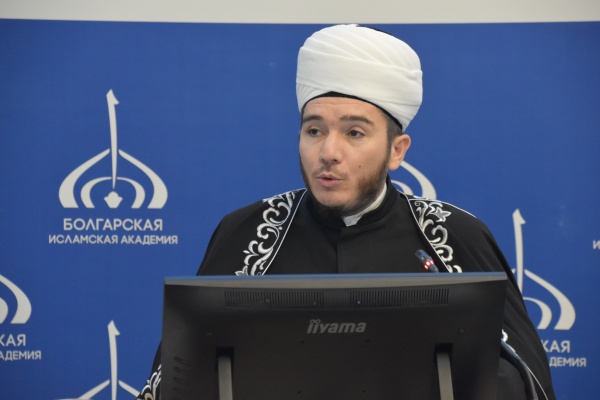
Ilfar hazrat Hasanov
“Return of the authority of traditional for us Islam and Muslim clergy is one of the key tasks facing us now”, Deputy Mufti of the Tatarstan Republic, imam-khatib of the Kul Sharif Mosque Ilfar hazrat Hasanov highlighted during the plenary session. “Thanks to the support of our leaders, the Muslim community of Tatarstan has structurally formed and defined with its theological benchmarks and principles of functioning, having entered a very important stage of its formation – the revival, which requires significant intellectual efforts. That is why the policy of the Spiritual Board of Muslims of the Tatarstan Republic is permeated by the ideas of Islamic enlightenment, upbringing of own Tatar theologians and representatives of Muslim intelligentsia, who are able to become spiritual and moral leaders of the nation”.
According to the Mufti’s words, Islam in the region, relying on the richest theological heritage and centuries-old experience of development of the religious education system, in the foreseeable future will be able to make a significant contribution to the stability of the Russian Federation. After all, it is Tatarstan where Islam exists in the conditions of multiculturalism, cooperation with all the public, state and religious organizations. It was highlighted by Rector of the Bulgarian Islamic Academy Daniyar Abdrakhmanov, who also drew attention of the audience to the fact that inter-religious and inter-ethnic peace and harmony are the most treasured.
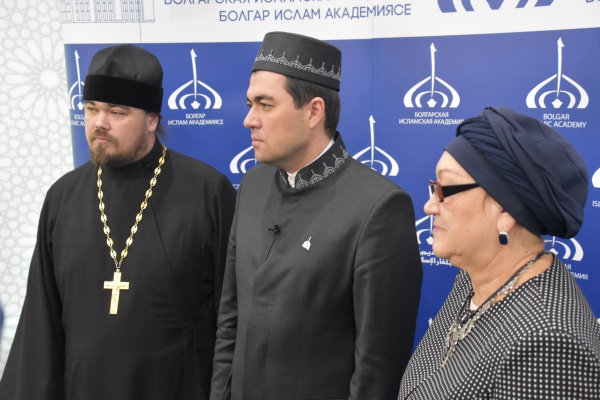
In his turn, Holy Hierarch Innokenty, Bishop of Elabuga, Curate of the Kazan Diocese, congratulated the participants with the beginning of the conference and wished to spend these days as productively as possible, not only getting acquainted with the colleagues’ experience in the establishment of inter-religious dialogue and its further development, but also immersing themselves into centuries-old history of the ancient city of Bolgar.
Good relations between Muslims and Christians have historically established in the Republic of Tatarstan. We can see this tradition even now both at the level of relations between people, and work of Mukhtasibats and Chairmen of religious communities: priests and imams participate side by side in socially significant events and meetings, while the authorities provide all possible support. For instance, a large-scale project to restore monuments in ancient cities of Bolgar and Sviyazhsk is being implemented in our republic, as well as the construction of the Bulgarian Islamic Academy and the Cathedral on the site of the discovery of Our Lady of Kazan by personal decree of President of the Republic of Tatarstan Rustam Minnikhanov (Chairman of the Strategic Vision Group “Russia – Islamic World”).
There is also an important fact that on July 22 this year, there was signed the agreement between the Bulgarian Islamic Academy and the Kazan Theological Seminary, which outlined new borders and opportunities for cooperation between representatives of two religions. To date, a roadmap of joint events, scientific and educational forums has been developed. In addition to it, it has become a good tradition for students of the Orthodox Seminary to attend Muslim educational institutions for a closer acquaintance with the Muslim system of education and development of joint projects to strengthen spiritual links within society.
Concluding the plenary session of the conference “Islam and Society: Regional Aspect”, Elmira Sadykova, Executive Director of the Foundation for Strategic Partnership with the Islamic World, Head of the Centre for Inter-religious Dialogue of the Bulgarian Islamic Academy, spoke in more detail about the fact that Islam was an integral part of the Tatarstan and Russian society.
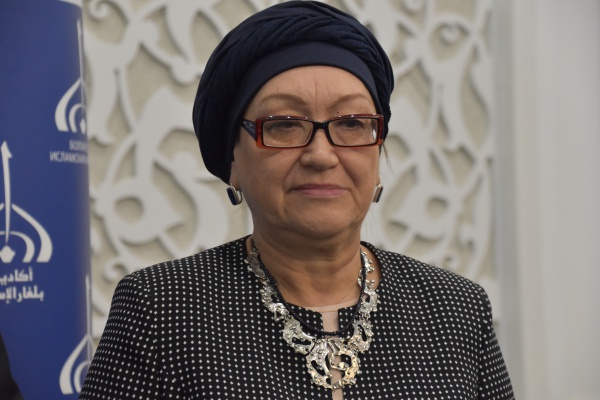
Elmira Sadykova
“The Bulgarian Islamic Academy, which has been established nowadays, is one of the most important Islamic educational institutions not only in Russia, but also in the entire CIS”, Elmira Sadykova pointed out. “Here future theologians are prepared, all-Russian and international conferences and meetings, aimed at strengthening inter-religious and inter-cultural ties between peoples of Russia and the entire world, are held. The example of the Bulgarian Islamic Academy shows that creation of such Islamic institutions in our country contributes to the comprehensive development of Islam in Russia itself and the strengthening of strong ties between peoples of our country. I hope that during our fruitful work we will outline a further plan of work to strengthen intercultural and interreligious dialogue”.
Today there are about 20 million Muslims and some regions with prevailing Muslim population in the territory of Russia. It allows Russia to exchange its own experience in building efficient intercultural dialogue with other countries. In this regard, it is important to mention the Strategic Vision Group “Russia – Islamic World”, which was established in 2006 by Evgeny Primakov and Mintimer Shaimiev. It is composed of more than 33 well-known public figures from 27 Muslim countries, including former Prime-Ministers, Ministers for Foreign Affairs and theologians. The main task of the Group is to facilitate further rapprochement of Russia with the Islamic world on cultural and civilizational basis, to establish contacts with a focus on expanding economic, scientific, technical, cultural and humanitarian cooperation. Particular attention is paid to joint measures to counter international terrorism, which, in its essence, is contrary to the fundamental principles of Islam.
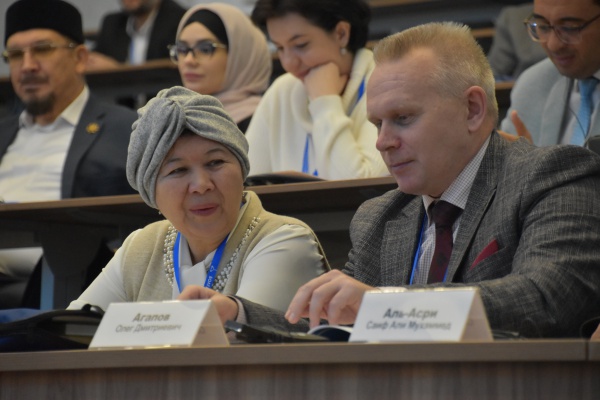
In conclusion, Elmira Sadykova expressed confidence that the participants of the conference would contribute to the development of dialogue and cultural exchange between regions, as well as of effective tools to promote the ideas of peaceful, good-neighborly relations between representatives of different religions and cultures.
We would like to remind that on October 14 the opening ceremony of the First International Forum “Theological Heritage of Russian Muslims”, within which the conference “Islam and Society: Regional Aspect” is held. On the new scientific-theological platform the issues of preservation, study and development of traditional Islamic spiritual values of Muslim peoples of Russia, development of domestic Islamic theology and Islamic education, strengthening of cultural, civilizational and inter-religious dialogue in Russia and worldwide are discussed.
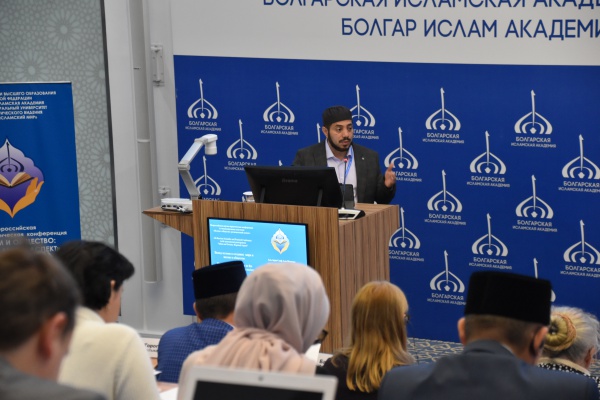
The conference “Islam and Society: Regional Aspect” will work during two days and allow the participants from the farthest regions of Russia (for instance, Khabarovsk) and other countries (Kazakhstan, Azerbaijan, Finland) not only to get acquainted with the unique experience of the Tatarstan Republic in building intercultural and interreligious dialogue, but also to tell about their experience, including paying the audience’s attention to the necessity to revive universal human spiritual and moral values, on which any society is based. In the framework of this conference, there is a question of not only interaction between representatives of traditional for peoples of Russia religions and confessions, but also of establishment and further development of the Muslim education system, as well as features of occurrence and Muslim community activities in mainly orthodox regions of the Russian Federation.
Ilmira Gafiyatullina
